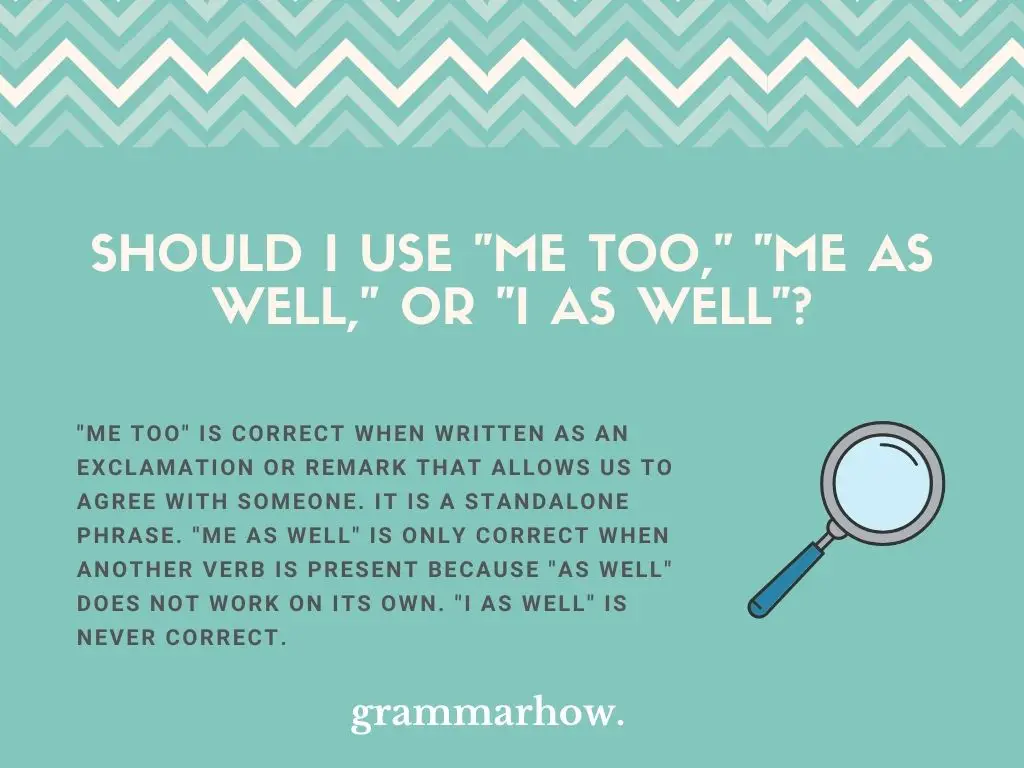Everyone knows about the phrase “me too.” However, “too” and “as well” are synonymous, yet “me as well” doesn’t seem nearly as popular. This article will look at the differences, as well as whether “I as well” is appropriate.
Should I Use “Me Too,” “Me As Well,” Or “I As Well”?
“Me too” is correct when written as an exclamation or remark that allows us to agree with someone. It is a standalone phrase. “Me as well” is only correct when another verb is present because “as well” does not work on its own. “I as well” is never correct.

Here are some examples (with explanations) of each one:
- He gave it to me.
- Me too!
Here, we are replicating “me” from the original statement. We can use “me” again in the exclamation “me too” to show we agree.
- It affects me a lot being here.
- It affects me as well.
“Me as well” is only correct when a verb is present. In this case, we use “affects” as the verb to show how it might look.
- I gave it to you.
- I too!
While it’s argued that we should replicate the pronoun from the first statement, “I too” does not make sense in this situation. Instead, we would need to use a verb between “I” and “too” if we want it to be correct:
- I gave it to you.
- I did too!
Is “I As Well” Grammatically Correct?
“I as well” is not grammatically correct. Again, we can only use “as well” when there is a verb present. Since “I” is a subject pronoun, a verb should follow it if we are following grammatically correct rules.
Therefore, it’s impossible for a sentence structure to contain “I as well” and still be correct. Instead, we might see one of the following:
- I do as well.
- I work as well.
- I can go as well.
As you can see, if a verb is present, there is nothing wrong with using both “I” and “as well.” However, they must be separated by the verb. There are no cases where the form of “I as well” can touch.
Should I Use “Me As Well” Instead Of “I As Well”?
Just to reiterate the last section, we thought it would make sense to share some statistics.
According to Google Ngram Viewer, “me as well” is the only suitable option and is vastly more popular than “I as well.” There are no cases where “I” can be used in place of “me” in this situation.

“Me as well” is the only variation you should use. While it’s still not grammatically correct unless a verb form is present, we do not have to place the verb between “me” and “as well” because “me” is an object pronoun.
If you’re still not sure how the verb forms change things, this is what we mean:
- I do as well.
- This helps me as well.
The verb form must always come between “I” and “as well,” which is why it never makes sense together. However, the verb form can come before “me,” meaning that “me as well” is still a grammatically correct string.
Examples Of How To Use “I As Well” And “Me As Well” In A Sentence
We can go even further and refer you to these examples to help you:
- Correct: It will hurt me as well, but it must be done.
- Incorrect: You have annoyed I as well, though I suppose you don’t care.
- Correct: It changed me as well. I don’t think I’ll ever be the same.
- Incorrect: It worked for I as well, so I really recommend it.
- Correct: He knew me as well. I could see it in his eyes.
- Incorrect: You did it to I as well. I can’t believe you!
The phrase “me as well” works when a verb comes before it. However, there are no cases where we can use the phrase “I as well” together.
Examples Of How To Use “Me Too” In A Sentence
“Me too” is much simpler. It does not have the same dependency on verbs and other English rules, so these examples should make more sense.
- Me too! I knew that someone was bound to agree with me eventually.
- It affected me too! I don’t know why I had to be there for that.
- You annoyed me too. Please don’t do that again.
- Me too! Thank you for finally saying something.
- Oh, my god! Me too! That’s exactly what I was trying to get across.
- Will you talk to me too? Or do you not care much about what I have to say?
- Me too. I didn’t think that anyone else would agree.
“Me too” works as a standalone sentence or with another verb present. It can replace “me as well” in every case, but it can also be used on its own (when “me as well” will not work).
Is “Me Too” Informal?
“Me too” is generally considered an informal exclamation. While it allows us to agree with someone else’s sentiment, it might not be the best thing to shout when you are in a professional or formal situation.
However, it’s such a common thing to come across in English that you’ll find most formal people don’t mind it. It’s a natural and instinctive response when someone agrees with you about something or you can relate to them.
Is “Me As Well” Formal?
“Me as well” is considered more formal than “me too.” Using “as well” is generally a more formal phrase since it is more in line with grammatical correctness. As long as a verb form is present, it’s suitable to use “me as well” in formal situations.
Is “So Do I” Interchangeable With “Me Too” And “Me As Well”?
“So do I” means a similar thing to “me too” and “me as well,” but it’s not always interchangeable. It refers to a “doing” action, and it can only work if someone else says “do” in a statement.
For example:
- I do agree with you.
- So do I.
- I do agree with you.
- Me too.
As you can see, “so do I” and “me too” work in the same way.
However, these examples show that they are not always interchangeable:
- I would like to help you.
- Me too!
- I would like to help you.
- So do I!
“Do” was not mentioned in the first statement, so “so do I” is incorrect.
You may also like:
12 Better Ways To Say “Me Too”
“Mine Too” Or “Me Too”? Difference Explained (With Examples)
“Me too” or “Me, too”: Comma Rules Explained (With Examples)
Me To or Me Too? Grammar Explained (Helpful Examples)
Comma Before “As Well”? (Helpful Examples)
“As Well” at the End of a Sentence – Meaning & Proper Usage
Too or As Well – When to Use Each (Helpful Examples)
Aswell or As well? (Helpful Examples)

Martin holds a Master’s degree in Finance and International Business. He has six years of experience in professional communication with clients, executives, and colleagues. Furthermore, he has teaching experience from Aarhus University. Martin has been featured as an expert in communication and teaching on Forbes and Shopify. Read more about Martin here.
